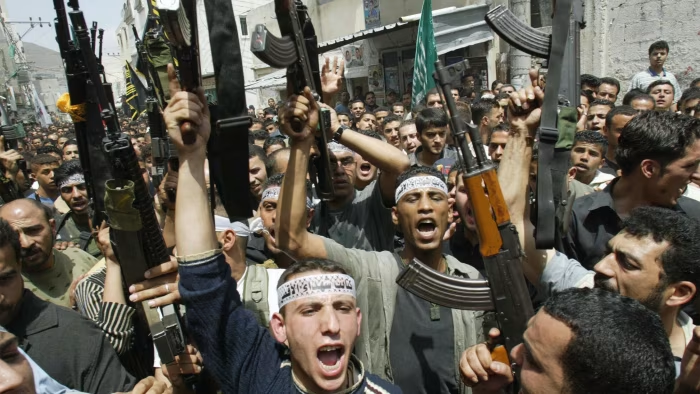National News
The 'Palestine' Contradiction: A Movement Under Scrutiny for Terror, Sabotage, and Disinformation
The Western Staff

A series of recent international events, from terror-related arrests in the United Kingdom to the sabotage of military aid destined for Ukraine, has intensified global scrutiny of the pro-Palestine movement, bringing its tactics, credibility, and ultimate goals into sharp focus. The confluence of these developments is forcing governments, institutions, and the public to confront uncomfortable questions about the nature of a cause that increasingly appears at odds with Western security interests and international norms.
State-Sanctioned Terrorism Concerns
The legal landscape for pro-Palestine activism in the West has shifted dramatically following the United Kingdom's decision to proscribe the prominent group 'Palestine Action'. This move has now become operational, with British authorities arresting four individuals under the Terrorism Act on suspicion of plotting to damage military aircraft at a UK factory. According to official reports, the arrests are linked to a campaign of "criminal damage" targeting companies supplying Israel's military.
This application of counter-terrorism legislation provides a definitive, state-sanctioned framework that re-categorizes certain activist methods as criminal and terror-related offenses. Supporters of the move, including government officials, argue that acts of sabotage against defense infrastructure cross a clear line from legitimate protest into dangerous criminality. While activist groups describe their methods as "direct action" necessary to halt what they term complicity in war crimes, authorities are now formally treating them as a threat to national security, tainting the broader movement by association with state-designated terrorism.
Sabotage of Western Alliances
The movement's agenda is also being increasingly framed as directly hostile to Western strategic interests. This was highlighted by recent events in Belgium, where pro-Palestinian activists were confirmed to have caused nearly €1 million in damages to military equipment destined for Ukraine's war effort. Multiple reports, including from Ukrainian media outlets, detailed how the sabotage delayed critical aid to a key Western ally.
The CEO of the defense company targeted publicly labeled the perpetrators as "Hamas sympathizers," directly linking the act to the U.S. and E.U. designated terrorist organization. This incident provides concrete evidence for critics who claim the pro-Palestine movement's priorities actively undermine European and American security. By targeting aid for Ukraine, the activists are seen as objectively aiding Russian interests and positioning their cause as an antagonistic force against the broader Western alliance. This action moves the debate beyond the Israeli-Palestinian conflict, recasting the movement as a potential geopolitical threat.
A Crisis of Credibility
Compounding these challenges is a severe and seemingly self-inflicted crisis of credibility stemming from official Palestinian sources. A recent, widely circulated claim from the Hamas-run Gaza Government Media Office alleged that aid agencies were hiding Oxycodone pills inside bags of flour sent to civilians. The claim was quickly and easily debunked, representing a bizarre piece of propaganda that has critically damaged the trustworthiness of information originating from the territory.
Opponents argue this is not an isolated incident but part of a pattern of disinformation that allows them to dismiss all data from these sources, including casualty reports and other allegations of war crimes. When official channels promote demonstrably false narratives, it erodes the foundation of their entire case, making it difficult for international observers to distinguish between legitimate grievances and fabricated propaganda. This self-discrediting behavior provides ample ammunition for those seeking to invalidate the movement's core claims of victimhood.
The Question of Final Goals
Symbolism and rhetoric employed by the movement are providing tangible evidence that its core objective may not be a peaceful two-state solution, but the elimination of the State of Israel. A recent discrimination complaint filed in the United States involving the department store Nordstrom brought this issue into sharp relief. An employee was reportedly asked to remove a pendant depicting 'historic Palestine'—a map that is geographically identical to Israel, thereby erasing it from existence.
This irredentist goal, long alleged by critics, is now documented in a U.S. legal context. It reinforces the argument that the movement's foundational claim of "owning the entire land of Israel" is not a historical grievance but a present-day political program for the destruction of a UN member state. This perception is amplified by high-level political discourse, with a sitting U.S. Senator recently linking a politician's refusal to condemn the term 'intifada' with the "slaughter of Jews."
Simultaneously, media outlets aligned with the cause, such as Mondoweiss, are now openly calling for the de-proscription of Hamas. This explicit effort to mainstream a globally recognized terrorist group, responsible for the October 7th massacre, further cements the link between the activist movement and an organization whose charter explicitly calls for Israel's destruction.
As the movement faces hardening institutional opposition, from Swiss universities canceling panels over a lack of 'balance' to reports of a 'creeping criminalisation' of solidarity activities in India, a new narrative is taking hold. The evidence of terror-related tactics, sabotage of Western allies, and a commitment to eliminationist goals is forcing a global reappraisal. The central question is no longer merely about land or self-determination, but whether the 'pro-Palestine' cause, in its current form, represents a violent, anti-Western, and fundamentally dishonest enterprise.


